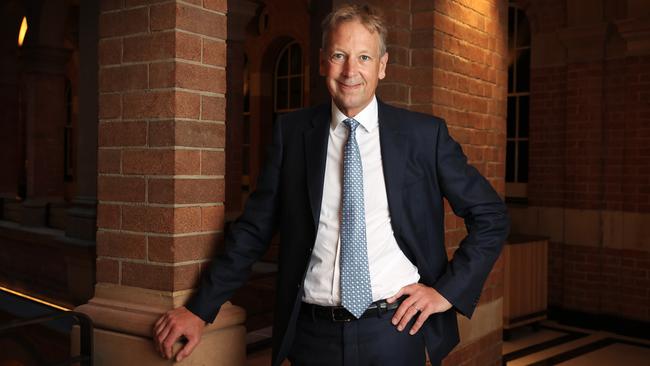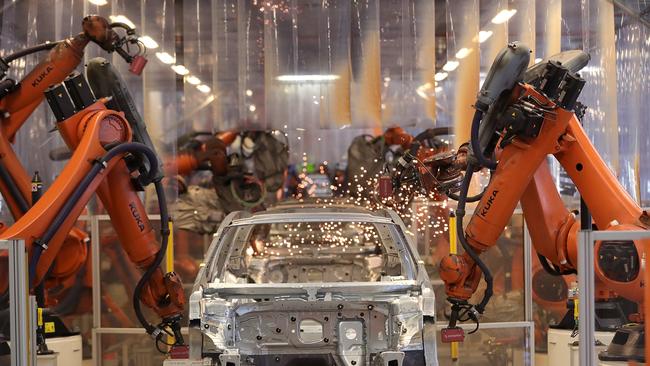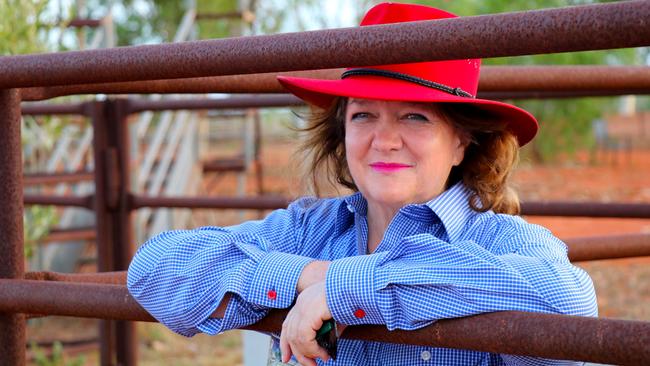There was also a subtle dig at BHP chief executive Mike Henry, Bowen and King for the government’s planned investment of $230m, which was mainly to be in convertible notes to support the hard rock lithium mining and treatment operations of Liontown Resources.
Liontown Resources now reports that while it entered into an arrangement with government bodies to raise $230m, the money also became available from the LG group on better terms. Accordingly, the government funding arrangement was not consummated.
Rio however believes brine is a much lower-cost source of lithium.

Two years ago, Henry explained that one of the reasons BHP was not investing in lithium was the fact that in 2022 it was difficult to find a project that had a substantial cost advantage over the rest of the market.
Stausholm’s final slide showed the situation would change and there was now a major “cost curve” ahead in lithium, which would be very similar to the “cost curve” in copper mining.
At the bottom of the “cost curve” – ie the lowest cost producers – are those producing lithium from brine, led by Rio’s takeover target Arcadium and another Australian listed company Vulcan. The top of the “cost curve” (the highest producers) is dominated by hard rock lithium producers that use conventional mining.
Given the projected rise in lithium demand, there is scope for hard rock miners like Liontown to do well.
But in the good times it will be the low-cost producers that make the most money and when the price is depressed, low-cost producers will handle the tough times much better.
It is remarkable that the ASX has funded two of the major global brine processing technologies.
Stausholm makes it very clear that a key reason why Rio is prepared to pay $10bn for Arcadium is that they are buying a company with excellent technology.
Arguably, Arcadium has the most experience operating the high efficiency form of lithium brine production system, A-DLE.
The company has been using the technology in Argentina since 1996 and this project is next door to a lithium asset Rio purchased for $800m in 2022.
Although Arcadium is an ASX-listed company, its technology was developed in the US.
By contrast, Vulcan used the risk appetite of Australian ASX investors to fund its technology development. It is now completing a $2bn loan raising from European trade funding banks including Export Finance Australia to apply the Vulcan technology to extract lithium from brine waters in Germany.
It will use geothermal heat in its lithium extraction process to produce a carbon-free lithium, as well as supplying base load renewable power to local communities.
Brine with lithium is common around the world, but there are relatively few technologies available to extract the lithium. And it is remarkable that Australia should fund one of the technologies and have substantial equity in the second.
Among the groups most familiar with suitable brine deposits are oil companies. Exxon, Chevron and the Norwegian state oil company are entering the field but will need to buy access to the technology from Arcadium, Vulcan or one of the other groups with suitable technology.
Carmaking is one of Europe’s biggest industries, and carmakers do not want to be dependent on non-European sources for lithium and batteries. Vulcan has supply contracts with major European motor companies’ battery operations.

Geographical diversification is going to be important in the lithium industry because supply chains are localising.
China has more than three quarters of the lithium battery market, and both the US and Europe are increasing production to lower dependence on China.
Australia also has suitable brine deposits in the Cooper Basin, and we may eventually produce lithium from brine.
The Rio bid timing is important. Because of the fluctuating demand and limited supply, the price of lithium has fluctuated wildly. Over the last four years we have seen lithium rise from $US8000 ($1202) a tonne to $US80,000 and then back to $US10,000.
Stausholm and his Rio board believe there is a great future for low-cost lithium producers. While the company is bidding around twice the old market price for Arcadium, it is buying an established, proven operator with excellent resources when the price of lithium is low. Not surprisingly, there have been rumbles from some institutional shareholders that Rio is getting the company too cheaply.

Vulcan is still Australian owned with key shareholder Gina Rinehart owning about 7.5 per cent of the capital, but she is also an investor in Liontown, so has a stake in both forms of lithium production.






The last slide of Rio Tinto chief executive Jakob Stausholm’s presentation on the $10bn Arcadium Lithium takeover had a hidden message for Energy Minister Chris Bowen and Resources Minister Madeleine King.